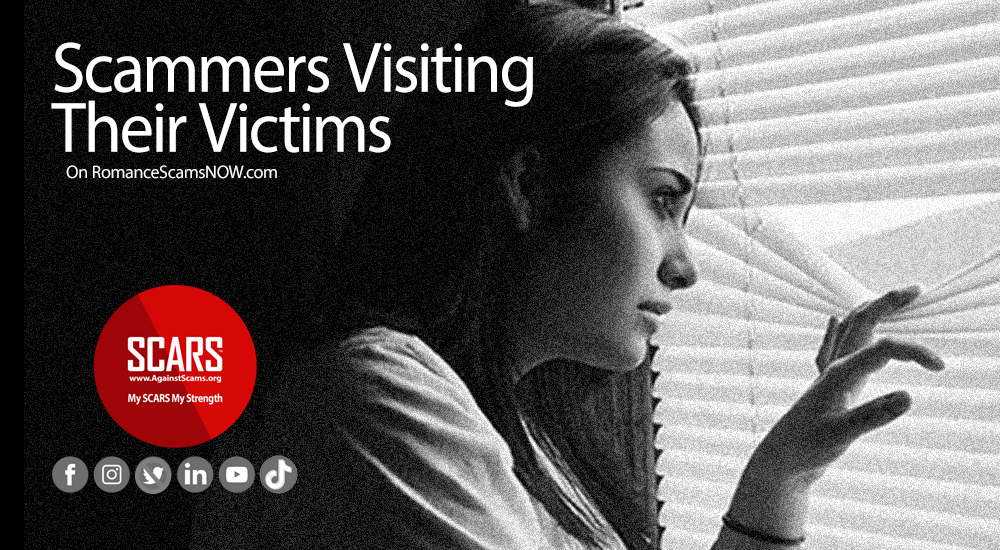A Typical Scammer Threat Is To Come To Where The Victim Lives!
But In Reality, This Is Just A Threat
As a scam winds down and ends, scammers commonly threaten all kinds of things. We have heard from victims that scammers have said:
- They would visit the victim and kill them. Shoot them, stab them, poison them.
- They would kill the victim’s family or children.
- They would report them to the police as a criminal.
- They would report them as a terrorist.
- They would have their government extradite the victim to some third-world country.
- They will watch them and stalk them.
- The list goes on and on …
However, it is almost all nonsense. It is just another form of manipulation. Another scam. In most cases.
After the scam ends, if the scammer cannot get any more money from the victim, they will use threats to achieve two potential goals.
- Silence the victim – the more victims that talk about their scams the more the scammer’s business is impacted.
- Set the victim up for a follow-on scam, Frightened victims are more likely to pay a fake investigator or a fake police officer to investigate and arrest the scammer. In this way, they can extend the scam or do a hand-off to another group to exploit that last bit of money the scam victim has.
But these are just more of the same – all lies – intended to extend the manipulation long after the scam relationship ends.
And Very Sadly, It Works!
No one knows the exact percentage of scam victims that are threatened after their scams, but some estimates are as high at 25%. And for those victims that are threatened, the after-scam experience is much worse. These threats can be truly frightening, causing much more severe trauma.
When Should You Ignore Threats?
In almost all cases the threats are going to be just more lies. This is especially true with the Africans.
You can also safely ignore threats when:
- The scammers are African – regardless of where you live. African scammers are only after the money.
- The scammers are Asian – but you live in the Americas or Europe. If the Asian scammers are in your same country, you should always notify the police.
- The scammers are Jamaican – but you do not live in Jamaica.
- The scammers are Middle Easter – but you live in Asia, the Americas, or in Europe.
When You Should Not Ignore The Threats?
There are a few cases – very rare – when you need to pay attention to the threats. This is mostly true of Eastern European Marriage scams where someone travels to Eastern Europe (Ukraine or Russia for example) and married a local woman. In these cases, these scams are often run by real mafia-style criminals, who may indeed have collaborators in many countries.
Russian scammers are especially good at transforming a marriage scam into something more and obtaining every bit of value from it.
However, the Africans do not do this, and most of the time neither do Asian or Latin American scammers.
The Wierd Case Of Being Married To A Scammer
Many scammers, especially African scammers try to convince their victims that they are legitimately married to them, by simply creating a fake marriage certificate.
In these bizarre scams as the victim stops sending money, scammers often say they are coming to claim you, their house, and property. But there is only one small problem – they are not married to their victims, it was just another lie. So do not worry about this, the scammer would never get a VISA or make it through immigration with such patent falsehoods.
Always Report To The Police
If you are ever threatened by a scammer you must report this to the police. Even if you were not threatened you should report the crime, but especially if there are threats.
However, regardless of where the scammer is or from, if you feel afraid talk to your police. That is what they are there for. They can help you feel more reassured and safe, and give you valuable tips about how to be safer in your local community.
The reason is so that the police has this information on file. Should you ever need a restraining order or protection, they have the original file or report to justify this. If you never reported it, then you have to start from scratch. Better to have reported the crime and be prepared than otherwise.
If you ever feel that you are in real danger always call 911 or your local emergency number. This is what they are there for!
Remember, the scammer will almost NEVER come to your door. Just report the scam and then do your best to recover from it.




Leave A Comment